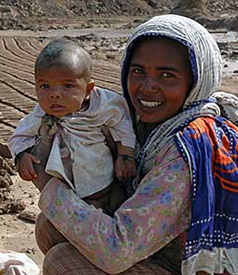
|  |  |  Editorials | Opinions | June 2009 Editorials | Opinions | June 2009  
Let's Stop Women's Suffering
 Mary Robinson & Alicia Yamin - Boston Globe Mary Robinson & Alicia Yamin - Boston Globe
go to original


| | A woman and her baby who were helped by the International Labour Organization. (Crozet M./ILO) |  |
Human Rights organizations around the world are starting to demand that governments recognize preventable maternal death as a violation of women's rights. With the United Nations Human Rights Council's June session just around the corner, governments have a chance to prove that they value women's lives by taking concrete action on this issue.

Many governments are already on board. In March, 85 countries called upon the council to take decisive action to contribute to the existing efforts to address maternal mortality. In this critical year leading up to the Millennium Development Goal review in 2010, the council has a historic opportunity in its June session to recognize the need to incorporate human rights into programs and policies designed to combat maternal deaths and encourage international cooperation and assistance in this area.

More than one woman dies every minute from preventable causes in childbirth, and for every woman who dies as many as 30 others are left with lifelong, debilitating complications. Moreover, when mothers die, children are at greater risk of dropping out of school, becoming malnourished, and simply not surviving. Not only is maternal mortality and morbidity a global health emergency, but it triggers and aggravates cycles of poverty that cause generations of suffering and despair.

But it is not just a hopeless tragedy. We know what is needed to save women's lives; we have known for 60 years what care women need when they face obstetric complications. The reason that women are still dying is because women's lives are not valued, because their voices are not listened to, and because they are discriminated against and excluded in their communities and by healthcare systems that fail to prioritize their needs. Human rights organizations such as Amnesty International, which has just launched a global campaign to reduce maternal mortality, are calling on governments to acknowledge that these utterly preventable deaths reflect widespread indifference to women's suffering and pervasive disregard for their fundamental human rights.

Yes, saving women's lives will take resources; estimates are about another $6 billion a year to be on track to achieve the Millennium Development Goal target and reduce maternal mortality by 75 percent from 1990 levels by 2015. That seems like a pretty cheap price to pay to save hundreds of thousands of women's lives each year. But 99 percent of maternal mortality occurs in the global South and especially in some of the poorest countries in Sub-Saharan Africa.

Asserting that these preventable deaths are an issue of human rights does not mean that poor governments are going to be blamed for not doing what they cannot do. Rather, understanding the profound injustice of disparities in maternal deaths makes it all the more urgent that donor states honor their funding commitments and that effective monitoring and accountability mechanisms are put in place to ensure that aid is going to the interventions that evidence has shown will save women's lives. Moreover, maternal mortality is a human rights issue within high-income countries as well, where data show that ethnic and racial minorities suffer disproportionately from pregnancy-related deaths.

Fourteen years ago at the Fourth World Conference on Women, then-First Lady Hillary Clinton declared that "women's rights are human rights." As secretary of state, Clinton has passionately and eloquently affirmed this administration's commitment to women's reproductive health needs around the world, and the Obama administration has called for increased funding for global health. As a new member of the Human Rights Council, the United States has the chance to lead the way in promoting a woman's right to go through pregnancy and childbirth in safety and, just as important, to back up that assertion with adequate funding commitments.

Mary Robinson and Alicia Yamin are advisory council members of the International Initiative on Maternal Mortality and Human Rights. |

 |
|  |



